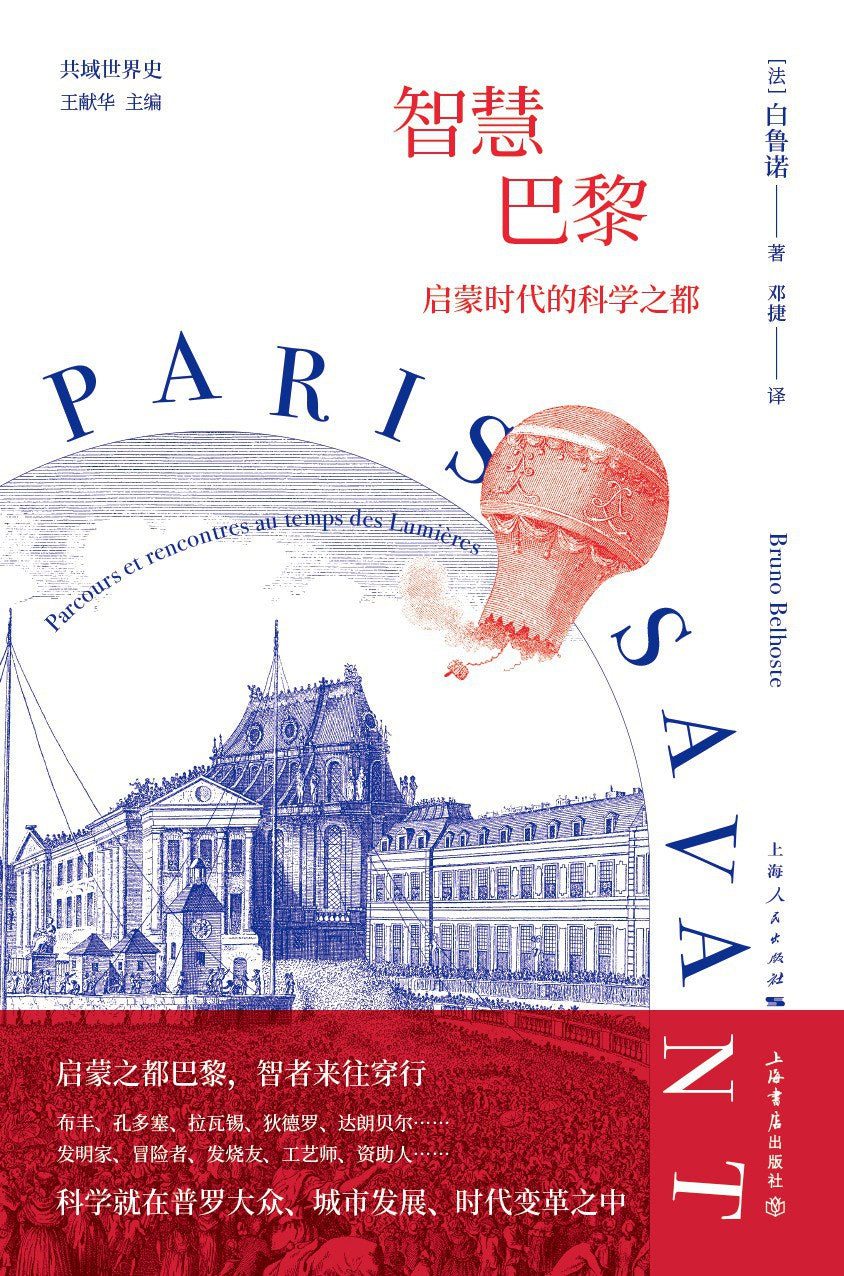WULOLIFE
《智慧巴黎:启蒙时代的科学之都》作者:[法]白鲁诺 译者: 邓捷 上海书店出版社
《智慧巴黎:启蒙时代的科学之都》作者:[法]白鲁诺 译者: 邓捷 上海书店出版社
Couldn't load pickup availability
Description
内容简介· · · · · ·
💡一部蓬勃绚烂的智慧城市发展史,展现启蒙时代科技的荟萃与交流。
【编辑推荐】
☆国际著名科学史家、法国巴黎第一大学教授白鲁诺力作,展现启蒙时代的“智慧城市”发展,描绘科学之都巴黎的万千世界。科技荟萃于此:升空热气球、坎凯油灯、天体力学、氧化学说、公制体系……智者无所不在:著作等身的法兰西科严谨认真的学者教授、热情钻研的发明家、觥筹交错的科学发烧友……
☆一份耳目一新的巴黎历史探寻指南,有料有趣、引人入胜:从拉丁区昂坦路到圣殿大道,从法兰西科学院到共济会九姐妹分会,从实验室到博物商店,沿途将偶遇布丰伯爵、孔多塞侯爵、拉瓦锡、狄德罗等伟人巨匠,还有无数共同塑造智慧巴黎的无名之辈……
☆一幅细致入微的智慧城市科学图景,包罗万象、深入透彻,详述法兰西科学院的权威与影响力,院文人共和国里的科学,科技工艺宝典《百科全书》引发的风波、巴黎科学界的地理分布,化学工艺与巴黎的五行八作,巴黎城里的机械,江湖术士的科学表演,交际科学与严肃科学,巴黎五花八门的发明,水分解、升空气球等的大型实验,巴黎的科学仪器制造,科学舆论与教育公众……
☆一部蓬勃绚烂的现代科学理念诞生记,精彩炫目、发人深省:巴黎科学机构与团体如何在启蒙运动中发挥重要作用?科学技术如何改善巴黎大都会的城市生活与工业发展?“科学监察官”法兰西科学院为何会与大革命产生冲突?服务王权的学者如何顺应潮流,转变为现代意义上的科学家?法兰西从旧制度迈入新世界,科学也融入普罗大众、城市发展、时代变革之中。
---
【内容简介】
科技荟萃于此:升空热气球、坎凯油灯、天体力学、氧化学说、公制体系……智者无所不在:著作等身的法兰西科学严谨认真的学者教授、热情钻研的发明家、觥筹交错的科学发烧友……达官贵人、市井百姓都对科现出疯狂的兴趣。
本书围绕18世纪充满活力的巴黎科学界展开,国际著名科学史家白鲁诺在其中探讨了巴黎的科技发展在法国启蒙运动中发挥的重要作用,不仅聚焦布丰、孔多塞、拉瓦锡、狄德罗等科学巨匠,也关注无数共同塑造智慧巴黎的发明家、冒险者、工艺师、资助人等。
全书以法兰西科学院为线索,涵盖科学机构建制、学科发展、发明创造、科学表演、公共卫生改造等主题,以一种全新的方式描绘了大革命前夕的巴黎,展现了现代科学理念如何融入普罗大众、城市发展、时代变革之中。
---
【著译者简介】
法国巴黎第一大学教授、近代史研究所所长。曾任法国国家科学技术史学会理事、法国科学院拉瓦锡委员会委员,以及多种国际著名学术杂志或丛书编委。其研究主要集中于18—19世纪法国的科学发展,在数学史、工程学史、科学机构史等方面著述甚丰,包括《柯西:一位19世纪正统派的数学家》《近代科学史:从文艺复兴到启蒙运动》《智慧巴黎:的科学之都》等。
邓捷,巴黎第四大学艺术史硕士、巴黎第三大学高等翻译学院硕士。现任教于巴黎第并定期举行法国历史、绘画方面的讲座。
---
【相关评论】
北京大学历史学系教授高毅
白鲁诺此书的独特价值,在于首次系统展示了自然科学在欧洲启蒙运动中扮演的角色。
中国科学院自然科学史研究所研究员姚大志
18世纪的巴黎是启蒙运动的发源地、发明家和工匠的汇聚处。白鲁诺教授将视野锁定在历史上的巴黎,从独特的视角回眸这座城市,考察启蒙运动和现代科学技术的互动关系。读者们会发现,杰出的思想家、伟的观念、重要的机构交织出现在此,世人熟知的宏伟宫殿、平凡街道、优美建筑曾经遍布科学家、工程师、发明家的足迹。科学思想和技术创新融入城市的发展脉动中,即使大革命风暴降临,也不能阻挡巴黎成长为世界科学中心。
H-France Review
一部姗姗来迟、早该出版的作品,填补了18世纪法白鲁诺生动展现了变革时代巴黎科学的图景……全书鲜活而有趣,并不为人知之处。
作者简介· · · · · ·
法国巴黎第一大学教授、近代史研究所所长。曾任法国国家科学技术史学会理事、法国科学院拉瓦锡委员会委员,以及多种国际著名学术杂志或丛书编委。其研究主要集中于18—19世纪法国的科学发展,在数学史、工程学史、科学机构史等方面著述甚丰,包括《柯西:一位19世纪正统派的数学家》《近代科学史:从文艺复兴到启蒙运动》《智慧巴黎:的科学之都》等。
译者简介:
邓捷,巴黎第四大学艺术史硕士、巴黎第三大学高等翻译学院硕士。现任教于巴黎第并定期举行法国历史、绘画方面的讲座。
